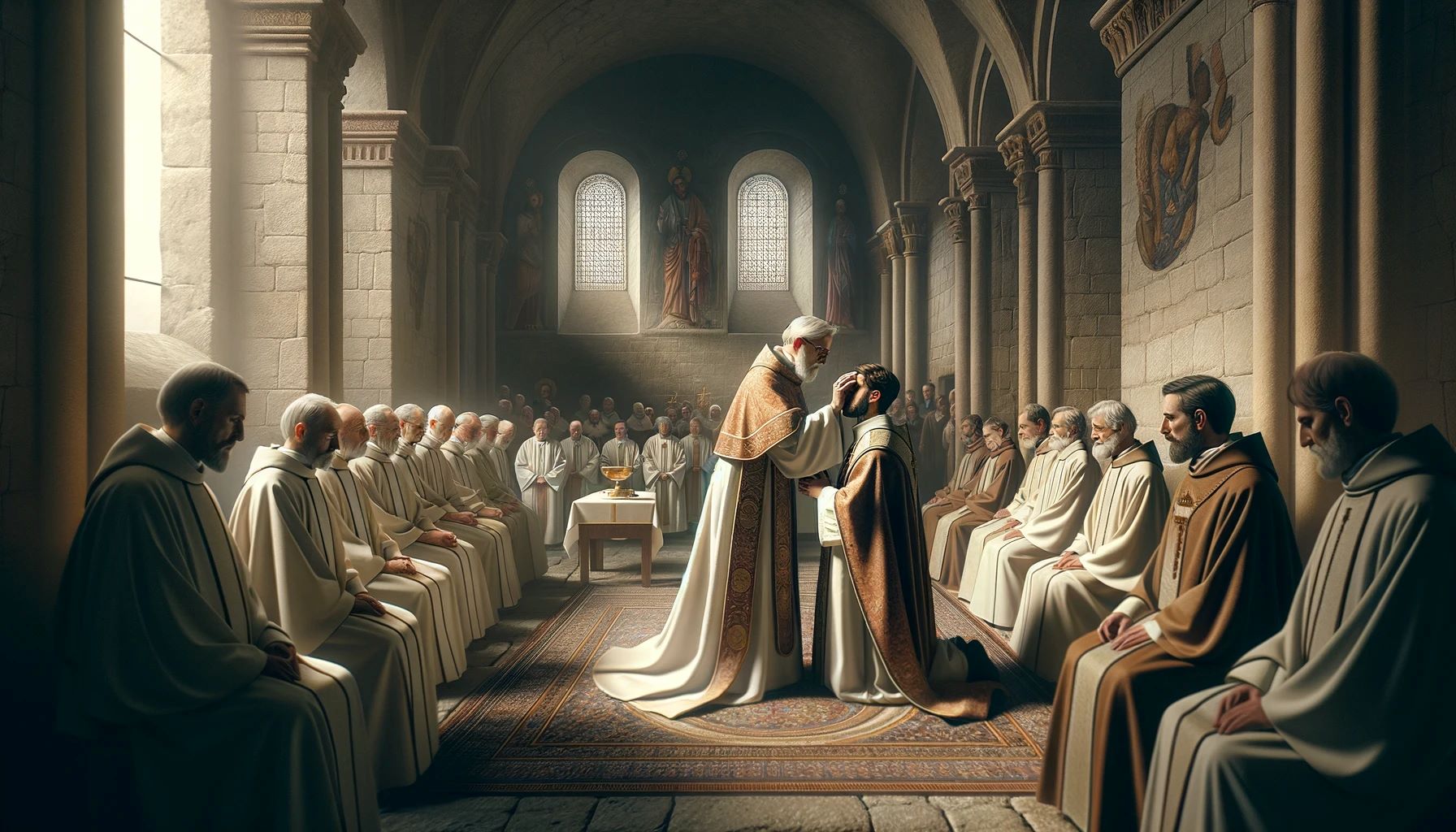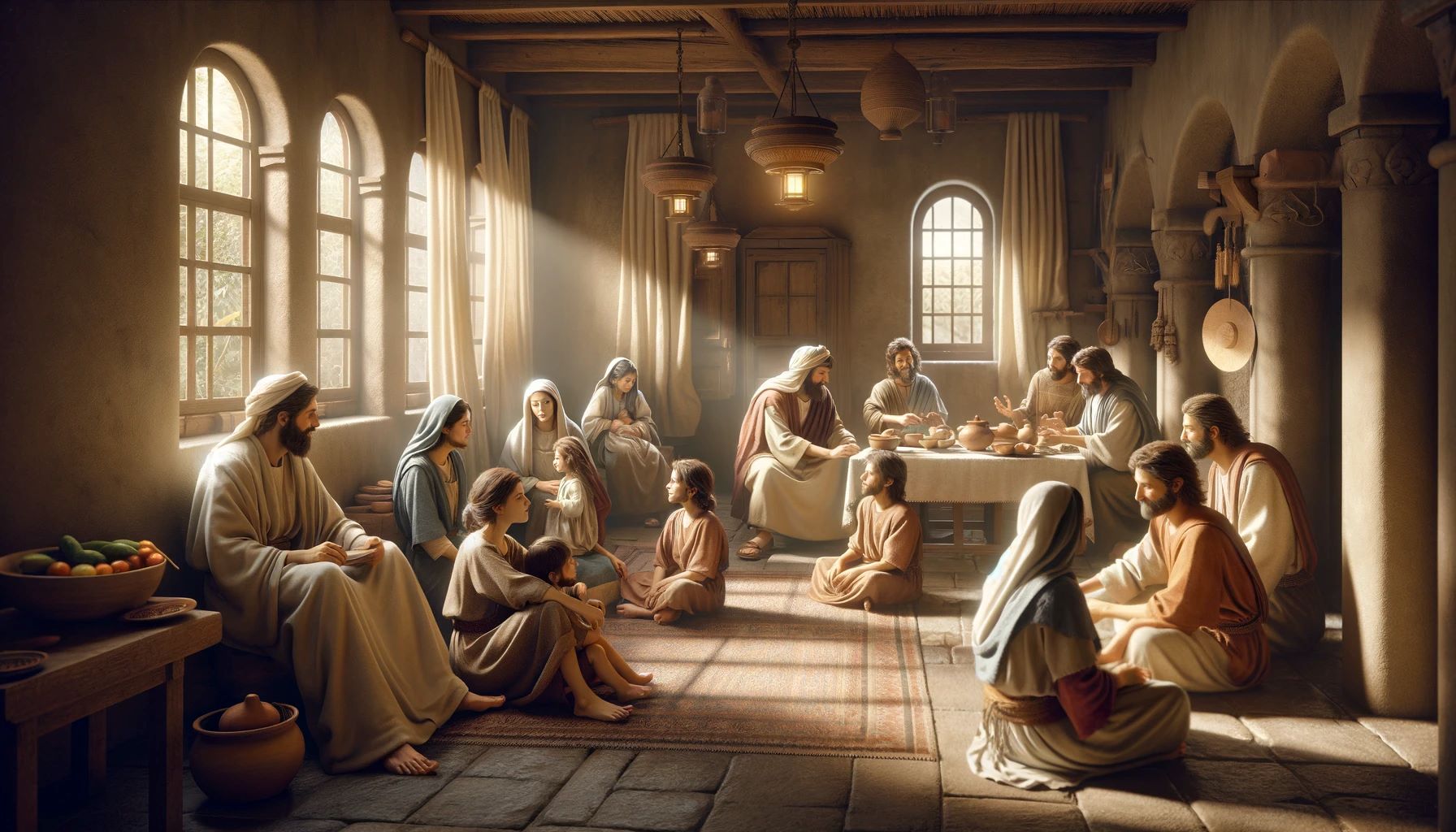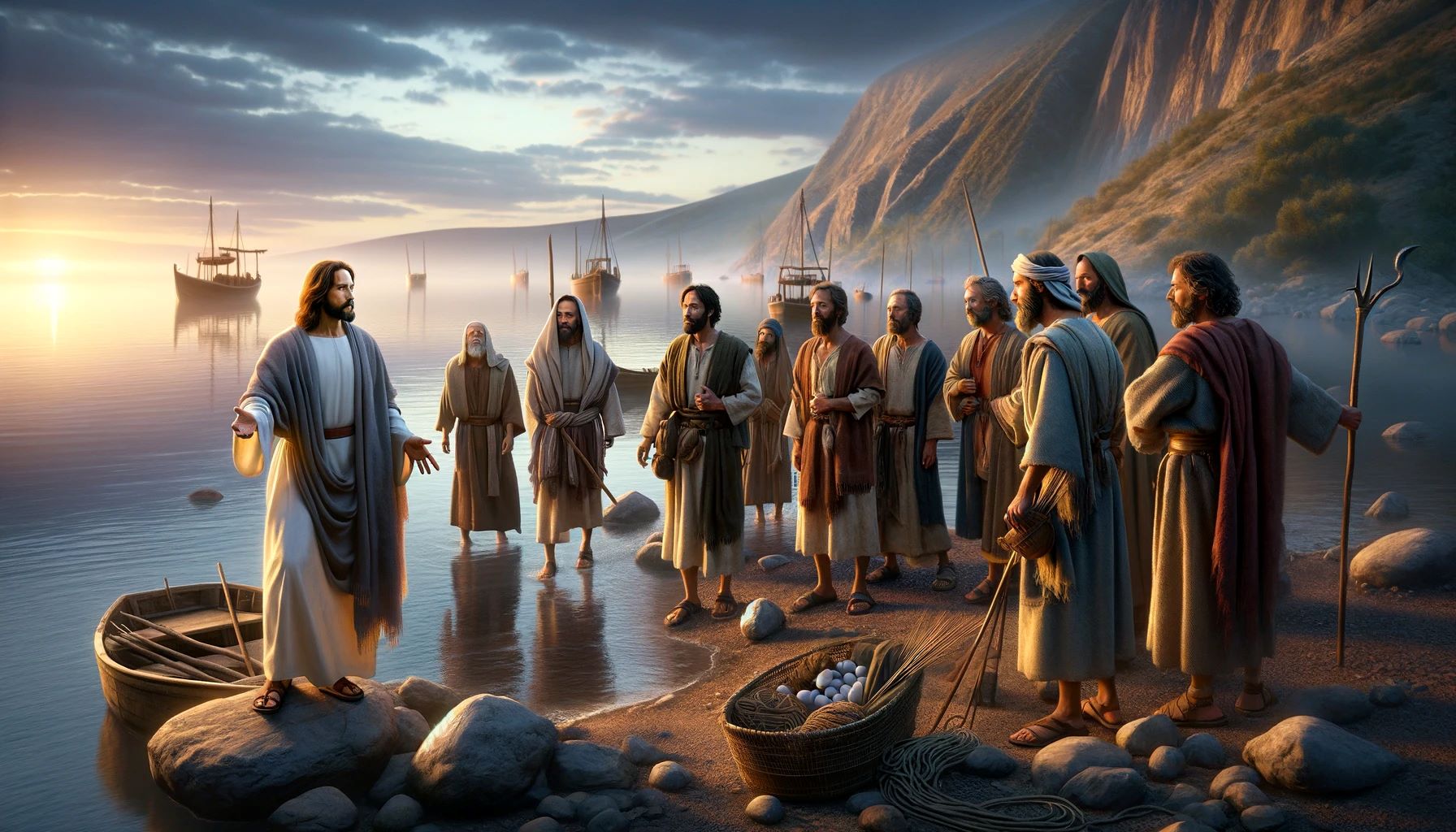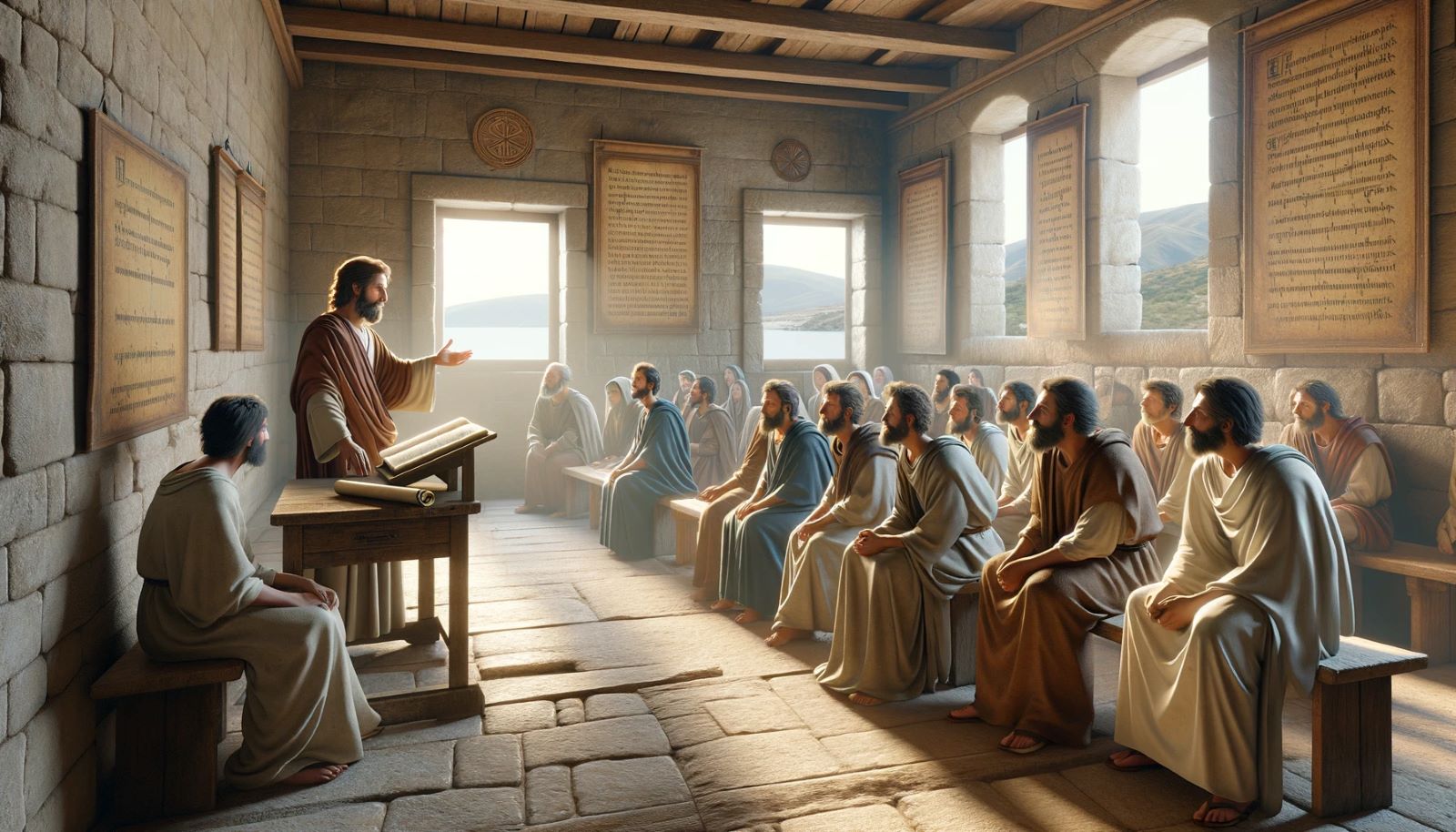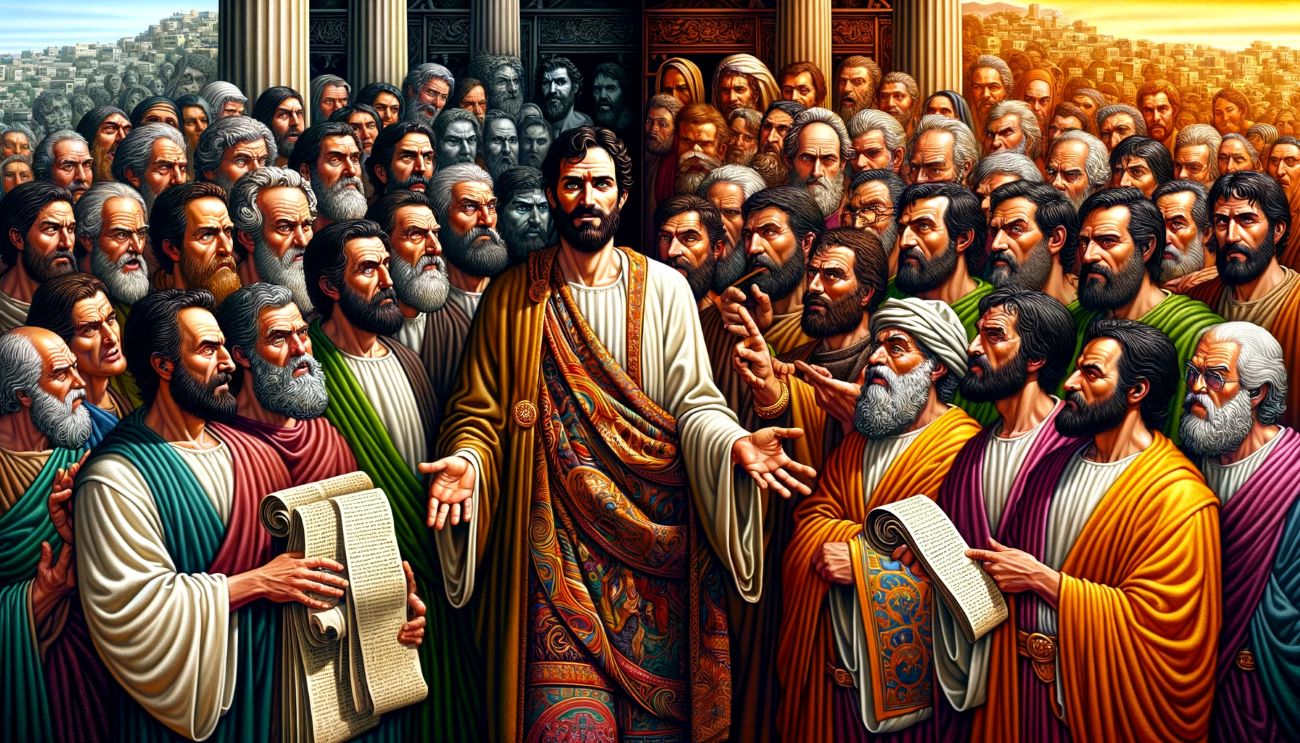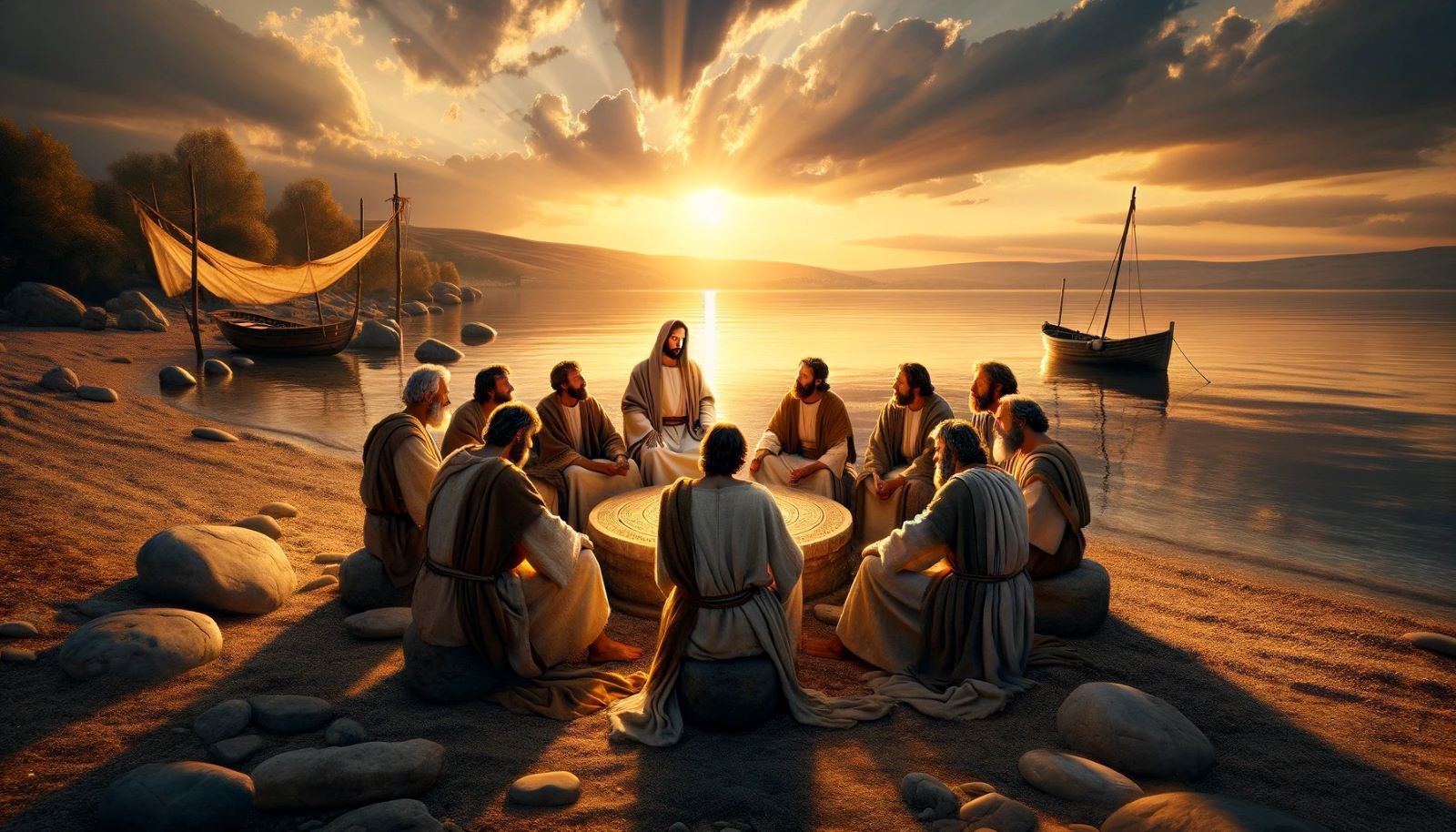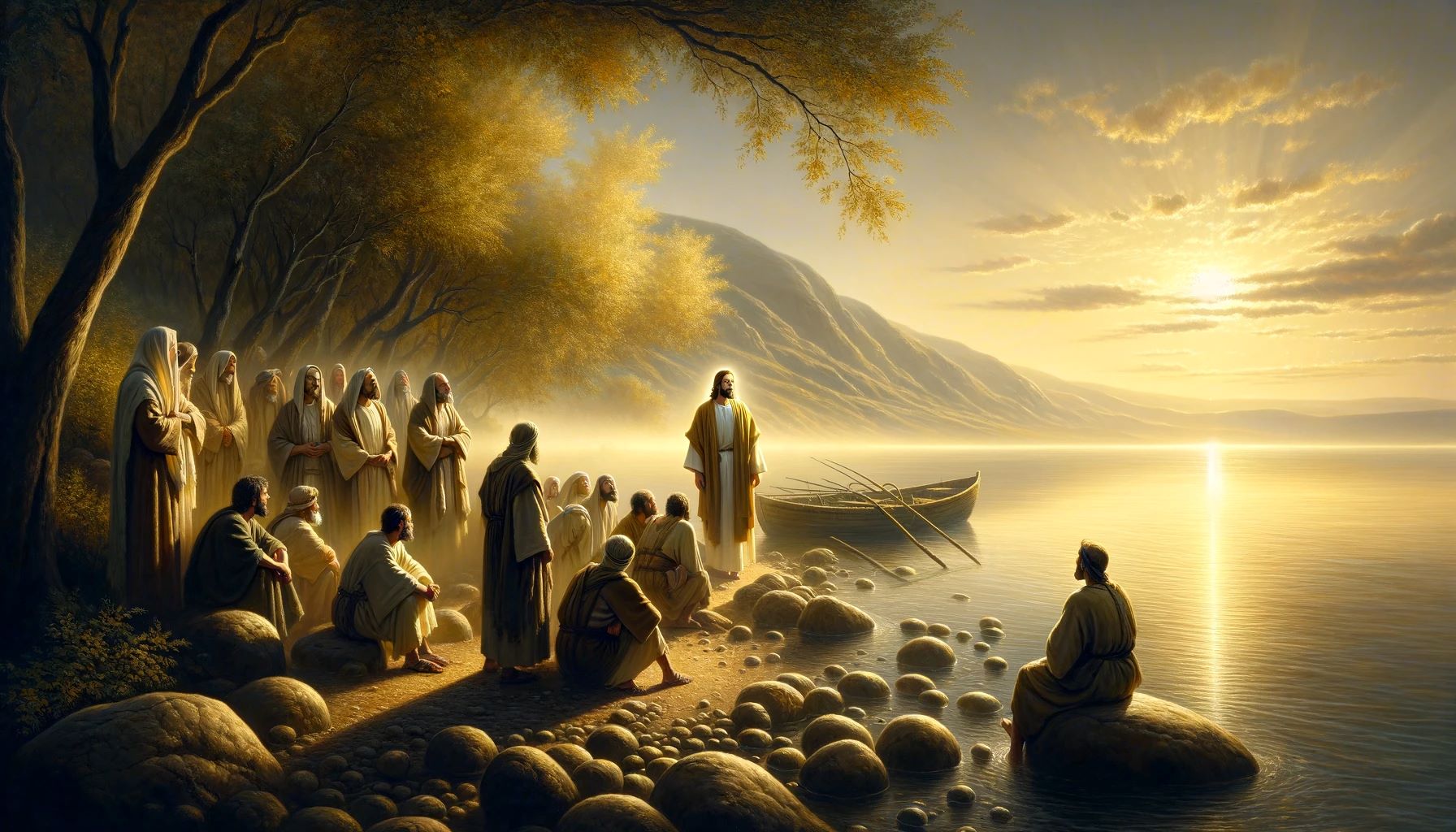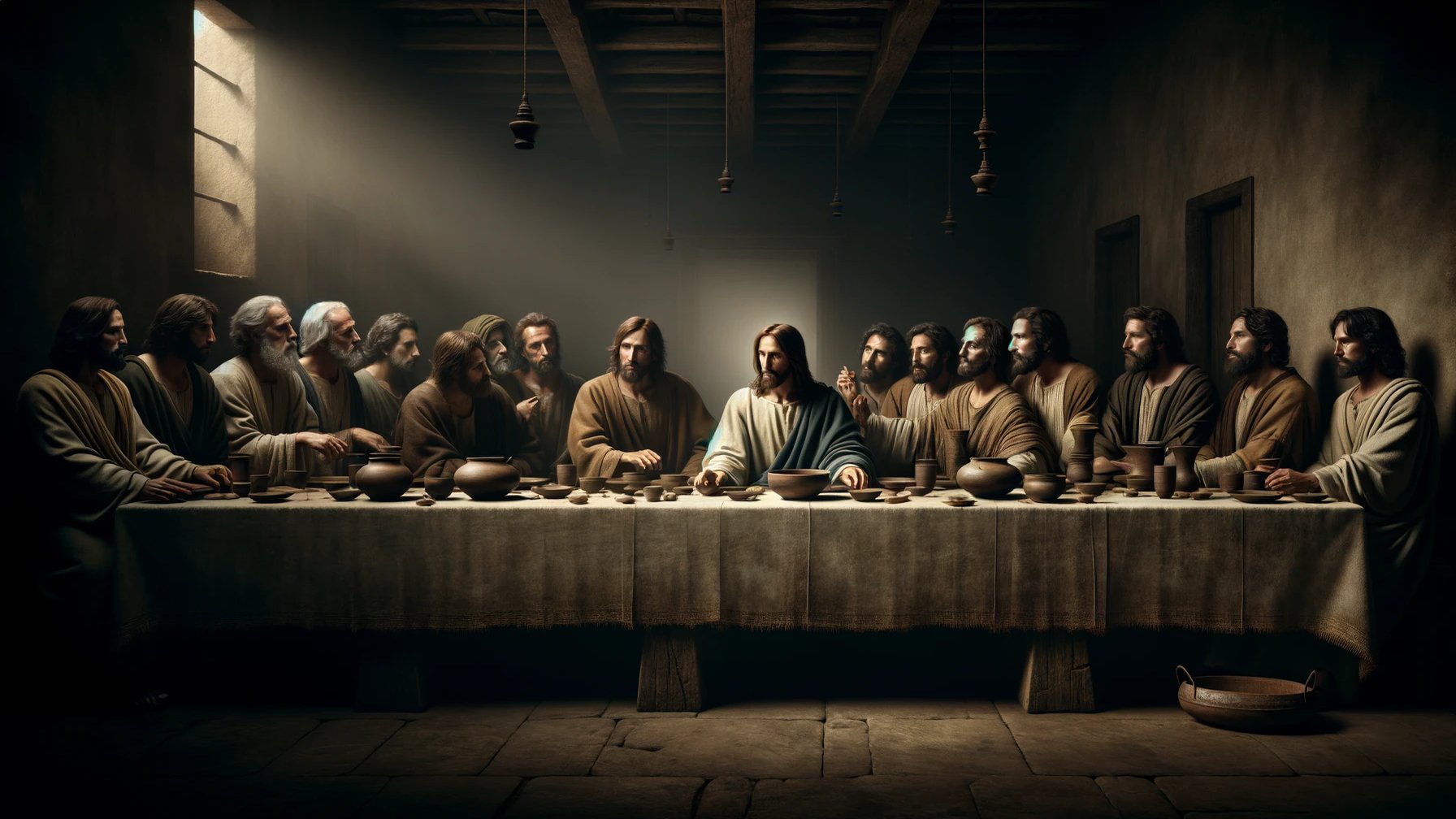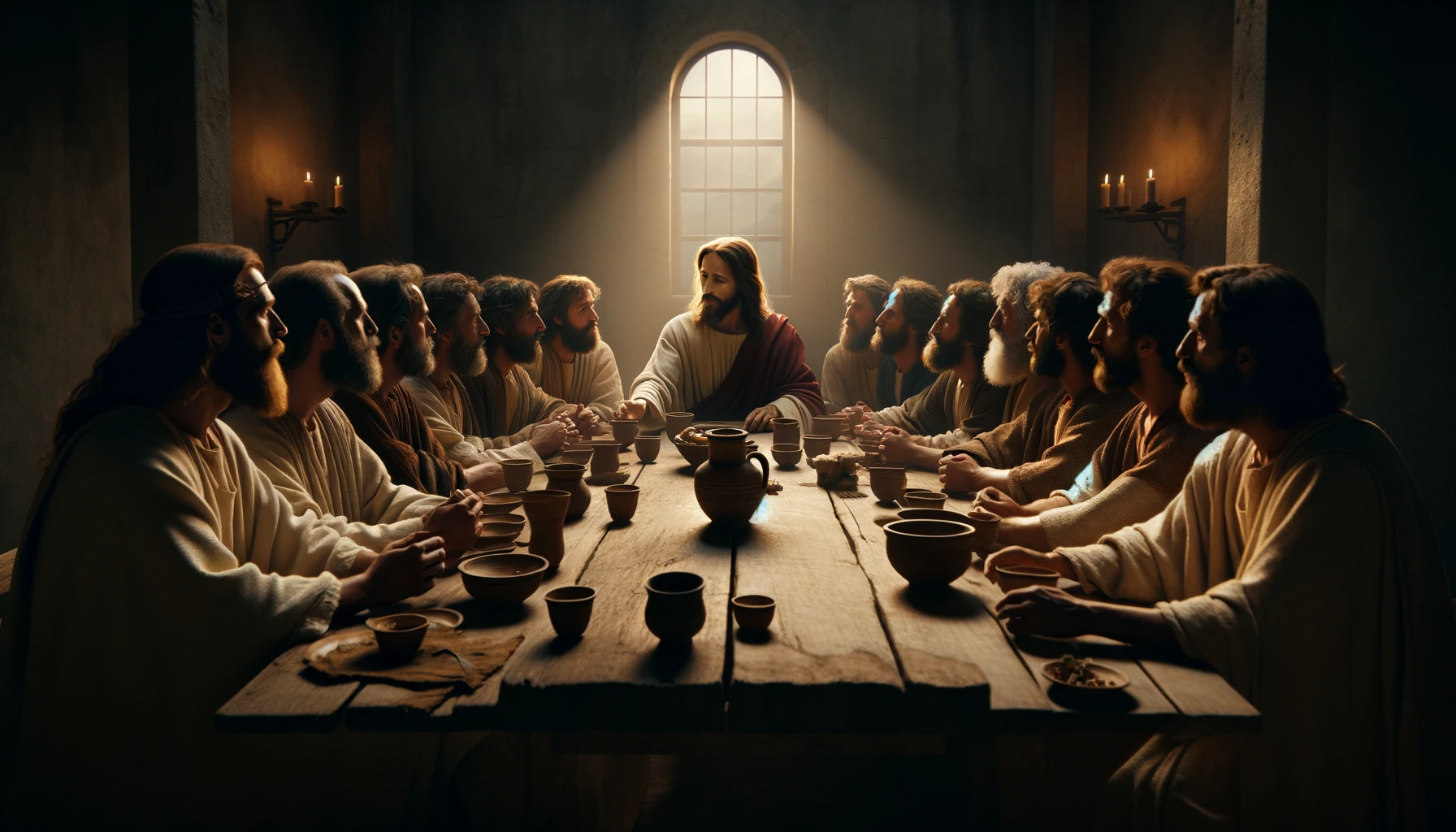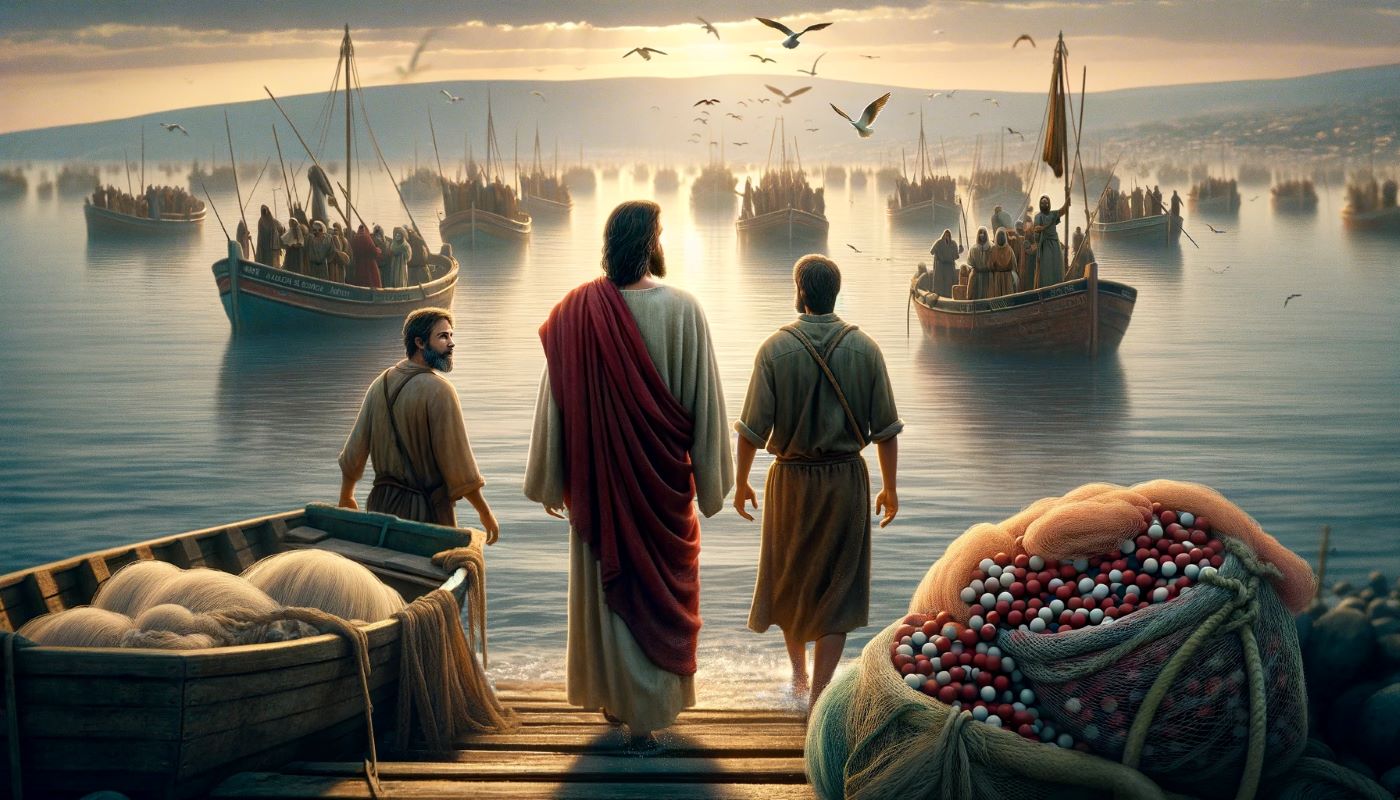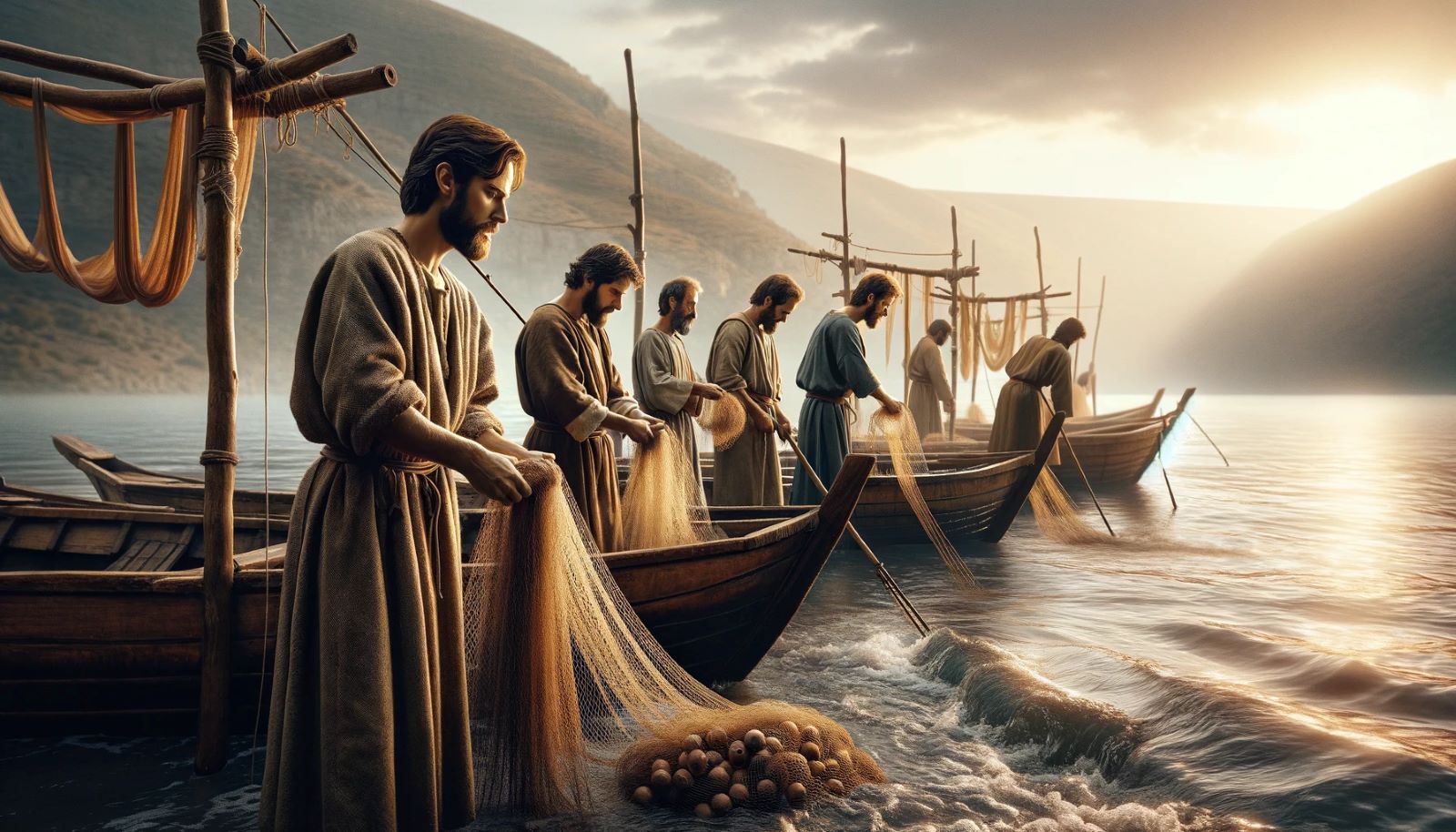Home>Bible Facts>Who Were The Twelve Apostles At The Last Supper?


Bible Facts
Who Were The Twelve Apostles At The Last Supper?
Published: February 17, 2024
Ericka Andersen, an editor at Christian.net, expertly merges digital strategy with content creation, focusing on faith and societal issues. Her communication skills enhance the platform's engaging narratives, fostering meaningful dialogue on belief's impact on society.
Discover fascinating Bible facts about the twelve apostles present at the Last Supper. Uncover their identities and significance in Christian history. Explore more with us!
(Many of the links in this article redirect to a specific reviewed product. Your purchase of these products through affiliate links helps to generate commission for Christian.net, at no extra cost. Learn more)
Table of Contents
Introduction
The Last Supper is a pivotal event in the Christian faith, symbolizing the final meal that Jesus shared with his twelve apostles before his crucifixion. This sacred gathering holds immense significance, as it marks the institution of the Holy Eucharist and the initiation of the sacrament of Holy Communion. At the heart of this momentous occasion are the twelve apostles who were chosen by Jesus to accompany him on his divine mission. Each apostle played a unique role in the ministry of Jesus and the establishment of the early Christian church.
As we delve into the identities and contributions of the twelve apostles present at the Last Supper, we gain a deeper understanding of their individual personalities, strengths, and the profound impact they had on the spread of Christianity. Their unwavering dedication and unwavering faith serve as an enduring testament to the transformative power of belief and the enduring legacy of the Last Supper. Let's embark on a journey to explore the lives and legacies of these remarkable individuals who stood by Jesus during this momentous occasion.
Read more: How Were The Twelve Apostles Killed
Simon Peter
Simon Peter, originally known as Simon, was a prominent figure among the twelve apostles present at the Last Supper. He held a position of leadership and often served as the spokesperson for the group. Peter's unwavering devotion to Jesus and his pivotal role in the early Christian church make him a central figure in biblical history.
Peter's journey with Jesus began when he was a fisherman on the shores of the Sea of Galilee. It was during one of his fishing expeditions that Jesus called out to him, saying, "Follow me, and I will make you fishers of men." This defining moment marked the beginning of Peter's transformative journey as a disciple of Jesus.
Throughout the Gospels, Peter's impulsive nature and unwavering loyalty to Jesus are vividly portrayed. One of the most iconic moments in Peter's life occurred during the Last Supper when Jesus predicted that Peter would deny him three times before the rooster crowed. Despite Peter's vehement protestations that he would never forsake Jesus, this prophecy came to pass, leading to Peter's profound remorse and eventual redemption.
After Jesus' resurrection, Peter emerged as a central figure in the early Christian community. His bold and impassioned sermons, particularly on the day of Pentecost, galvanized many to embrace the teachings of Jesus. Peter's unwavering faith and resilience in the face of persecution exemplify his profound commitment to spreading the message of Christ.
Peter's enduring legacy extends beyond his earthly endeavors. He is revered as the rock upon which the Christian church was built, symbolizing steadfastness and unwavering faith. His letters, preserved in the New Testament, offer timeless wisdom and guidance to believers, reflecting the depth of his spiritual insight and pastoral care.
In recounting Peter's pivotal role at the Last Supper, we are reminded of the complexities of human nature and the transformative power of redemption. His journey from a humble fisherman to a foundational figure in the Christian faith serves as an enduring testament to the boundless grace and mercy of God.
As we reflect on Peter's life, we are inspired by his resilience, humility, and unwavering commitment to his calling. His story resonates across generations, offering a profound example of faith, forgiveness, and the enduring impact of one's devotion to a higher purpose.
Andrew
Andrew, the brother of Simon Peter, was among the select group of twelve apostles who shared in the profound experience of the Last Supper. His journey as a disciple of Jesus was marked by humility, steadfastness, and a deep sense of devotion to his master.
Andrew's introduction to Jesus is depicted in the Gospels, where he is described as a fisherman alongside his brother Simon. It was through the influence of John the Baptist that Andrew first encountered Jesus. Upon hearing John's proclamation that Jesus was the Lamb of God, Andrew's heart was stirred, and he sought out the revered teacher. This pivotal encounter marked the beginning of Andrew's transformative journey as a devoted follower of Jesus.
Throughout his time with Jesus, Andrew's quiet yet resolute demeanor distinguished him as a steadfast and loyal disciple. While he may not have occupied the spotlight like some of his peers, his unwavering commitment to Jesus and his teachings was unwavering. Andrew's humility and willingness to serve were evident in his actions, reflecting a deep understanding of Jesus' message of love and servanthood.
One of the most notable accounts of Andrew's faithfulness is his role in the miraculous feeding of the five thousand. When faced with the daunting task of providing food for the multitude, Andrew demonstrated remarkable faith by bringing a young boy's meager offering of five barley loaves and two fish to Jesus. This simple act of faith and generosity exemplified Andrew's unwavering trust in Jesus' ability to work miracles, showcasing his profound understanding of the divine power at work.
Following the Last Supper and the subsequent events leading to Jesus' crucifixion and resurrection, Andrew emerged as a fervent proclaimer of the Gospel. His missionary endeavors took him to various regions, including Greece and Asia Minor, where he fearlessly spread the message of Christ, ultimately sealing his legacy as a passionate evangelist.
Andrew's unwavering commitment to his calling and his selfless dedication to sharing the good news of Jesus serve as an enduring example for believers. His life reflects the profound impact of quiet, steadfast faith and the transformative power of humble service. Andrew's legacy continues to inspire generations of Christians, reminding us of the profound influence of those who faithfully and diligently follow the path of their calling.
In exploring Andrew's role at the Last Supper, we are reminded of the profound impact of individuals who, though often overlooked, play a pivotal role in shaping the course of history. His steadfast devotion and unwavering faith stand as a testament to the enduring power of commitment and humility in the service of a greater purpose.
James, son of Zebedee
James, the son of Zebedee, was one of the twelve apostles who shared in the profound experience of the Last Supper. His journey as a disciple of Jesus was marked by unwavering dedication, fervent zeal, and a steadfast commitment to his calling. Alongside his brother John, James was part of the inner circle of disciples who shared in some of the most intimate and transformative moments of Jesus' ministry.
In the Gospels, James is often depicted as a passionate and zealous disciple, known for his fiery temperament and unyielding devotion to Jesus. His fervent spirit and unwavering loyalty to his master were evident in various accounts throughout the Gospels, underscoring his deep commitment to the teachings and mission of Jesus.
One of the most pivotal moments in James' journey with Jesus occurred when he, along with Peter and John, was chosen to witness the transfiguration of Jesus on the mountaintop. This extraordinary event, where Jesus' divine glory was revealed, left an indelible impression on James, further solidifying his unwavering faith and deepening his understanding of Jesus' divine nature.
Despite his fervent dedication, James, like the other disciples, grappled with moments of human frailty and misunderstanding. In one instance, he and his brother John sought positions of honor and authority in the kingdom of God, prompting a gentle rebuke from Jesus, who taught them about the true nature of servant leadership and humility.
As the events leading to the crucifixion of Jesus unfolded, James stood alongside his fellow apostles, grappling with the profound sorrow and confusion that engulfed them. The Last Supper, a poignant and sacred gathering, became a testament to James' unwavering commitment to Jesus, as he partook in the solemn meal that would forever alter the course of history.
Following the resurrection of Jesus, James emerged as a bold and courageous proclaimer of the Gospel. His unwavering faith and fervent zeal propelled him to embrace his role as a fervent evangelist, fearlessly spreading the message of Christ to distant lands. His missionary endeavors took him to Spain, where he fearlessly proclaimed the teachings of Jesus, ultimately sealing his legacy as a passionate herald of the Gospel.
James, son of Zebedee, stands as a compelling example of unwavering faith, fervent zeal, and unyielding commitment to the cause of Christ. His life and legacy continue to inspire believers, serving as a testament to the transformative power of wholehearted devotion and the enduring impact of those who fervently embrace their calling.
In recounting James' pivotal role at the Last Supper, we are reminded of the profound impact of individuals who wholeheartedly dedicate themselves to a higher purpose. His fervent spirit and unwavering commitment stand as a testament to the enduring power of unwavering faith and fervent zeal in the service of a greater calling.
John
John, often referred to as the beloved disciple, holds a revered place among the twelve apostles who were present at the Last Supper. His profound bond with Jesus, marked by deep affection and unwavering loyalty, distinguishes him as a central figure in the narrative of Jesus' ministry and the establishment of the early Christian church.
Throughout the Gospels, John is portrayed as a disciple characterized by profound love and devotion. His intimate relationship with Jesus is vividly depicted, particularly in the account of the Last Supper, where he reclined close to Jesus, symbolizing the closeness and affection that defined their bond. This portrayal of John as the disciple whom Jesus loved underscores the depth of their connection and the profound impact of their relationship on the unfolding of Jesus' ministry.
One of the most poignant moments at the Last Supper was when John leaned against Jesus, seeking comfort and closeness. This tender gesture encapsulates the depth of their bond and John's profound understanding of Jesus' love and compassion. It is within this intimate setting that Jesus imparted the profound teachings and assurances that would sustain the disciples in the tumultuous events that lay ahead.
Following the Last Supper, John stood alongside his fellow apostles as they grappled with the impending trials and tribulations. His unwavering presence and steadfast commitment to Jesus during this pivotal moment underscored his deep sense of loyalty and dedication. Despite the challenges and uncertainties that loomed on the horizon, John's resolute faith remained unwavering, a testament to the enduring strength of his devotion.
After the resurrection of Jesus, John emerged as a prominent figure in the early Christian community. His profound understanding of Jesus' teachings and his unwavering commitment to spreading the message of love and redemption positioned him as a fervent proclaimer of the Gospel. John's enduring legacy is encapsulated in his authorship of the Gospel of John, the three epistles that bear his name, and the Book of Revelation. These writings reflect his profound spiritual insight, unwavering faith, and deep love for Jesus, offering timeless wisdom and guidance to believers across generations.
John's life and legacy serve as a compelling testament to the transformative power of love, loyalty, and unwavering faith. His intimate bond with Jesus and his steadfast commitment to the Gospel exemplify the enduring impact of wholehearted devotion and the profound influence of those who embrace the call to follow Christ.
In recounting John's pivotal role at the Last Supper, we are reminded of the profound impact of individuals who wholeheartedly dedicate themselves to a higher purpose. His deep affection for Jesus and unwavering commitment stand as a testament to the enduring power of love and loyalty in the service of a greater calling.
Read more: What Apostles Were At The Last Supper
Philip
Philip, one of the twelve apostles present at the Last Supper, occupies a significant place in the narrative of Jesus' ministry and the establishment of the early Christian church. His journey as a disciple of Jesus was marked by a deep sense of inquiry, steadfast dedication, and a profound commitment to understanding and sharing the teachings of Christ.
In the Gospels, Philip is depicted as a thoughtful and inquisitive disciple, often seeking clarity and understanding from Jesus. One notable account of Philip's earnest quest for knowledge is seen when he approaches Jesus with a request to show them the Father. This poignant exchange reflects Philip's sincere desire to comprehend the divine nature of Jesus and the essence of his teachings, underscoring his deep yearning for spiritual understanding.
Philip's unwavering commitment to Jesus and his teachings is further exemplified in his role during the miraculous feeding of the five thousand. When faced with the daunting task of providing food for the multitude, Philip's pragmatic approach is evident as he calculates the cost of purchasing bread. This interaction not only reveals Philip's practical mindset but also serves as a testament to his deep concern for the well-being of the people gathered around Jesus.
At the Last Supper, Philip's presence alongside his fellow apostles symbolized his steadfast commitment to Jesus and the profound significance of the sacred gathering. As they partook in the solemn meal, Philip's unwavering dedication and earnest pursuit of spiritual truth were palpable, reflecting his deep reverence for the transformative message that Jesus imparted.
Following the resurrection of Jesus, Philip emerged as a fervent proclaimer of the Gospel, fearlessly spreading the message of Christ to distant lands. His missionary endeavors took him to various regions, where he passionately shared the teachings of Jesus, ultimately leaving an indelible mark as a dedicated evangelist.
Philip's life and legacy serve as a compelling testament to the transformative power of inquiry, dedication, and unwavering faith. His earnest pursuit of spiritual understanding and his steadfast commitment to sharing the message of Christ exemplify the enduring impact of wholehearted devotion and the profound influence of those who embrace the call to follow Jesus.
In recounting Philip's pivotal role at the Last Supper, we are reminded of the profound impact of individuals who wholeheartedly dedicate themselves to a higher purpose. His deep sense of inquiry and unwavering commitment stand as a testament to the enduring power of dedication and spiritual pursuit in the service of a greater calling.
Bartholomew
Bartholomew, also known as Nathanael, was a revered figure among the twelve apostles who shared in the profound experience of the Last Supper. His journey as a disciple of Jesus was marked by humility, profound insight, and unwavering dedication to his master.
In the Gospels, Bartholomew is often mentioned in conjunction with Philip, his fellow apostle. It was Philip who introduced Bartholomew to Jesus, proclaiming, "We have found the one Moses wrote about in the Law, and about whom the prophets also wrote—Jesus of Nazareth, the son of Joseph." This pivotal encounter marked the beginning of Bartholomew's transformative journey as a devoted follower of Jesus.
Bartholomew's unwavering commitment to Jesus and his teachings is exemplified in his encounter with Jesus, who described him as "a true Israelite, in whom there is no deceit." This profound acknowledgment not only revealed Jesus' intimate knowledge of Bartholomew but also affirmed the depth of Bartholomew's faith and sincerity of heart.
At the Last Supper, Bartholomew's presence alongside his fellow apostles symbolized his steadfast commitment to Jesus and the profound significance of the sacred gathering. As they partook in the solemn meal, Bartholomew's unwavering dedication and profound insight into the teachings of Jesus were palpable, reflecting his deep reverence for the transformative message that Jesus imparted.
Following the resurrection of Jesus, Bartholomew emerged as a fervent proclaimer of the Gospel, fearlessly spreading the message of Christ to distant lands. His missionary endeavors took him to various regions, where he passionately shared the teachings of Jesus, ultimately leaving an indelible mark as a dedicated evangelist.
Bartholomew's life and legacy serve as a compelling testament to the transformative power of humility, profound insight, and unwavering faith. His unwavering commitment to Jesus and his profound understanding of the teachings of Christ exemplify the enduring impact of wholehearted devotion and the profound influence of those who embrace the call to follow Jesus.
In recounting Bartholomew's pivotal role at the Last Supper, we are reminded of the profound impact of individuals who wholeheartedly dedicate themselves to a higher purpose. His humility and unwavering commitment stand as a testament to the enduring power of dedication and spiritual insight in the service of a greater calling.
Matthew
Matthew, also known as Levi, was a pivotal figure among the twelve apostles present at the Last Supper. His journey as a disciple of Jesus was marked by a profound transformation, unwavering commitment, and a deep sense of purpose in sharing the message of Christ.
Prior to encountering Jesus, Matthew was a tax collector, a profession that often incurred disdain and mistrust from the Jewish community. However, when Jesus extended an invitation to Matthew, saying, "Follow me," it marked the beginning of a transformative journey. Matthew responded to this call with unwavering faith, leaving behind his former life to embrace a new path as a devoted follower of Jesus.
One of the most significant moments in Matthew's journey with Jesus was the pivotal encounter at his own house, where he hosted a gathering that included tax collectors and sinners. This event sparked criticism from the religious authorities, prompting Jesus to affirm his mission by stating, "It is not the healthy who need a doctor, but the sick. I have not come to call the righteous, but sinners." This powerful declaration not only affirmed Matthew's newfound purpose but also underscored the inclusive nature of Jesus' ministry, emphasizing the transformative power of grace and redemption.
At the Last Supper, Matthew's presence alongside his fellow apostles symbolized his unwavering commitment to Jesus and the profound significance of the sacred gathering. As they partook in the solemn meal, Matthew's deep sense of gratitude and reverence for the transformative message that Jesus imparted was palpable, reflecting his profound understanding of the redemptive mission that defined his calling.
Following the resurrection of Jesus, Matthew emerged as a fervent proclaimer of the Gospel. His Gospel, bearing his name, stands as a testament to his unwavering commitment to sharing the teachings of Jesus with the world. Through his Gospel, Matthew conveyed the profound message of salvation and the fulfillment of Old Testament prophecies in the life and ministry of Jesus, offering timeless wisdom and guidance to believers across generations.
Matthew's life and legacy serve as a compelling testament to the transformative power of redemption, unwavering commitment, and a deep sense of purpose. His journey from a tax collector to a devoted apostle exemplifies the enduring impact of wholehearted devotion and the profound influence of those who embrace the call to follow Jesus.
In recounting Matthew's pivotal role at the Last Supper, we are reminded of the profound impact of individuals who wholeheartedly dedicate themselves to a higher purpose. His transformation and unwavering commitment stand as a testament to the enduring power of redemption and purpose in the service of a greater calling.
Thomas
Thomas, also known as Didymus, holds a significant place among the twelve apostles who were present at the Last Supper. His journey as a disciple of Jesus was marked by a profound sense of inquiry, unwavering loyalty, and a deep yearning for spiritual truth.
In the Gospels, Thomas is depicted as a disciple characterized by a thoughtful and inquisitive nature. His most renowned moment comes after the resurrection of Jesus when he expressed skepticism regarding the news of Jesus' appearance to the disciples. Thomas' insistence on tangible evidence, exemplified by his famous declaration, "Unless I see the nail marks in his hands and put my finger where the nails were, and put my hand into his side, I will not believe," underscores his earnest quest for certainty and truth. This candid expression of doubt has led to Thomas being commonly referred to as "Doubting Thomas."
Despite his initial skepticism, Thomas' unwavering commitment to Jesus was evident in his steadfast presence among the apostles. His profound loyalty and dedication to his master were palpable, particularly during the Last Supper, where his earnest pursuit of spiritual truth and unwavering faith were evident. As they partook in the solemn meal, Thomas' deep reverence for the transformative message that Jesus imparted was unmistakable, reflecting his profound understanding of the significance of the momentous occasion.
Thomas' journey with Jesus serves as a testament to the transformative power of doubt, inquiry, and unwavering faith. His candid expression of doubt and subsequent proclamation of belief upon encountering the risen Christ exemplify the enduring impact of wholehearted devotion and the profound influence of those who earnestly seek spiritual truth.
In recounting Thomas' pivotal role at the Last Supper, we are reminded of the profound impact of individuals who wholeheartedly dedicate themselves to a higher purpose. His candid expression of doubt and unwavering commitment stand as a testament to the enduring power of inquiry and faith in the service of a greater calling.
Read more: Who Were The Super Apostles
James, son of Alphaeus
James, son of Alphaeus, is a figure of profound significance among the twelve apostles who were present at the Last Supper. His role in the narrative of Jesus' ministry and the establishment of the early Christian church is marked by humility, steadfast dedication, and a deep commitment to his calling.
In the Gospels, James, son of Alphaeus, is often mentioned in the lists of the twelve apostles, yet his individual contributions and interactions with Jesus are not extensively documented. Despite the limited portrayal of his specific deeds, James, son of Alphaeus, stood alongside his fellow apostles during the Last Supper, symbolizing his unwavering commitment to Jesus and the transformative message that defined their collective mission.
James, son of Alphaeus, exemplifies the quiet yet steadfast dedication that characterized many of the apostles. His presence at the Last Supper, a poignant and sacred gathering, underscores his deep reverence for the teachings of Jesus and the profound significance of the momentous occasion. As they partook in the solemn meal, James, son of Alphaeus' unwavering commitment and profound understanding of the redemptive mission that defined his calling were palpable, reflecting his steadfast faith and humility.
Following the resurrection of Jesus, James, son of Alphaeus, continued to embrace his role as a devoted apostle, contributing to the early Christian community and the spread of the Gospel. His steadfast commitment to the teachings of Jesus and his unwavering dedication to the mission of spreading the message of Christ serve as a testament to the enduring impact of quiet, steadfast faith and the profound influence of those who diligently follow the path of their calling.
In recounting James, son of Alphaeus' pivotal role at the Last Supper, we are reminded of the profound impact of individuals who, though often overlooked in specific accounts, play a pivotal role in shaping the course of history. His quiet yet unwavering commitment stands as a testament to the enduring power of dedication and humility in the service of a greater calling.
Thaddaeus
Thaddaeus, also known as Judas, son of James, occupies a significant place among the twelve apostles who were present at the Last Supper. Despite the limited mention of his specific deeds in the Gospels, Thaddaeus' unwavering commitment to Jesus and the transformative message he carried exemplify the enduring impact of quiet, steadfast faith and the profound influence of those who diligently follow the path of their calling.
In the lists of the twelve apostles, Thaddaeus is often mentioned alongside his fellow disciples, yet the Gospels provide minimal detail regarding his individual interactions with Jesus. However, his presence at the Last Supper signifies his steadfast dedication to Jesus and the profound significance of the sacred gathering. As they partook in the solemn meal, Thaddaeus' unwavering commitment and profound understanding of the redemptive mission that defined his calling were palpable, reflecting his steadfast faith and humility.
Following the resurrection of Jesus, Thaddaeus continued to embrace his role as a devoted apostle, contributing to the early Christian community and the spread of the Gospel. His steadfast commitment to the teachings of Jesus and his unwavering dedication to the mission of spreading the message of Christ serve as a testament to the enduring impact of quiet, steadfast faith and the profound influence of those who diligently follow the path of their calling.
In recounting Thaddaeus' pivotal role at the Last Supper, we are reminded of the profound impact of individuals who, though often overlooked in specific accounts, play a pivotal role in shaping the course of history. His quiet yet unwavering commitment stands as a testament to the enduring power of dedication and humility in the service of a greater calling.
Simon the Zealot
Simon the Zealot, also known as Simon the Cananaean, was a revered figure among the twelve apostles who shared in the profound experience of the Last Supper. His journey as a disciple of Jesus was marked by unwavering dedication, fervent zeal, and a deep commitment to the transformative message of Christ.
The appellation "Zealot" attributed to Simon carries profound significance, as it denotes his association with the Zealots, a Jewish sect known for their ardent devotion to the Mosaic law and their fervent opposition to Roman rule. This affiliation underscores Simon's passionate and unwavering commitment to his beliefs, a fervor that would later be channeled into his devotion to Jesus and the propagation of the Gospel.
Simon's background as a Zealot reflects a deep-seated fervor for his convictions, a fervency that would have permeated his interactions with Jesus and his fellow apostles. His presence at the Last Supper symbolized his resolute commitment to Jesus and the profound significance of the sacred gathering. As they partook in the solemn meal, Simon's unwavering dedication and fervent zeal for the transformative message that Jesus imparted were palpable, reflecting his profound understanding of the redemptive mission that defined his calling.
Following the resurrection of Jesus, Simon emerged as a fervent proclaimer of the Gospel, fearlessly spreading the message of Christ to distant lands. His unwavering commitment to the teachings of Jesus and his impassioned zeal for the mission of spreading the message of Christ serve as a testament to the enduring impact of wholehearted devotion and the profound influence of those who fervently embrace their calling.
Simon the Zealot's life and legacy stand as a compelling testament to the transformative power of fervent zeal, unwavering commitment, and a deep sense of purpose. His journey from a fervent advocate to a devoted apostle exemplifies the enduring impact of wholehearted devotion and the profound influence of those who embrace the call to follow Jesus.
In recounting Simon the Zealot's pivotal role at the Last Supper, we are reminded of the profound impact of individuals who wholeheartedly dedicate themselves to a higher purpose. His fervent zeal and unwavering commitment stand as a testament to the enduring power of dedication and purpose in the service of a greater calling.
Judas Iscariot
Judas Iscariot, a name synonymous with betrayal, occupies a complex and somber place among the twelve apostles who were present at the Last Supper. His role in the narrative of Jesus' ministry and the events leading to the crucifixion is marked by profound tragedy, moral introspection, and the enduring impact of his fateful decision.
In the Gospels, Judas is often portrayed as the disciple who ultimately betrayed Jesus, a deed that has reverberated through the annals of history. His infamous act of betrayal, symbolized by the treacherous kiss in the Garden of Gethsemane, stands as a poignant reminder of the frailty of human nature and the profound consequences of moral transgression.
The motivations behind Judas' betrayal have been the subject of intense scrutiny and speculation. While some interpretations suggest financial greed or disillusionment with Jesus' perceived failure to establish an earthly kingdom, the complexities of Judas' inner turmoil remain shrouded in mystery. His pivotal role in the unfolding of Jesus' crucifixion, however, underscores the profound impact of his actions on the course of history and the redemptive narrative at the heart of the Christian faith.
The Last Supper, a sacred and solemn gathering, bore witness to Judas' presence alongside his fellow apostles, a poignant juxtaposition that underscores the tragic nature of his betrayal. As they partook in the solemn meal, the weight of Judas' impending act of treachery cast a somber shadow over the gathering, serving as a testament to the complexities of human frailty and the enduring consequences of moral transgression.
Following his betrayal, Judas grappled with profound remorse and anguish, ultimately leading to his tragic demise. The harrowing account of his despair and subsequent fate serves as a sobering reminder of the enduring impact of moral choices and the profound consequences of betrayal.
Judas Iscariot's tragic legacy stands as a compelling testament to the complexities of human nature, the enduring consequences of moral transgression, and the profound impact of his fateful decision. His role in the narrative of the Last Supper serves as a poignant reminder of the enduring consequences of betrayal and the complexities of human frailty.
In recounting Judas Iscariot's pivotal role at the Last Supper, we are confronted with the profound impact of moral choices and the enduring consequences of betrayal. His tragic legacy serves as a sobering reminder of the complexities of human nature and the enduring impact of fateful decisions.
